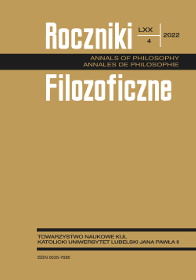Arguing for Freedom of Religion
Abstract
My title is “Arguing for Freedom of Religion,” not for “Toleration,” because I follow the eighteenth-century writer Christoph Martin Wieland in taking “toleration" to connote a gift or indulgence from a majority to a minority, whereas true freedom of religion would put everybody on the same plane to believe and practice religion as they see fit, or not at all. I consider three historically distinct ways of arguing for freedom of religion: from a premise held by one religion that requires freedom from others (the strategy of Locke, Madison, and Mendelssohn); from a premise about the uncertainty of all religious beliefs which calls for equal freedom (Bayle and Wieland); or from a fundamental requirement of equal freedom for all, with no premise about religion although it entails freedom in religious matters as in other things (Hutcheson, Meier, Kant). The latter approach may be most appealing from a purely philosophical point of view, but the former styles of argument have obviously had much to recommend them in historical contexts, and may still be useful.
References
Achenwall, Gottfried. Natural Law. 3rd ed. Edited by Pauline Kleingeld, trans. Cornelia Vermeulen, introduction by Paul Guyer. London: Bloomsbury, 2020.
Bayle, Pierre. A Philosophical Commentary on These Words of the Gospel, Luke 14:23, “Compel Them to Come In, That My House May be Full”. Edited by John Kilcullen and Chandran Kukathas. Indianapolis: Liberty Fund, 2005.
Forst, Rainer. Toleration in Conflict: Past and Present, trans. Ciaran Cronin. Cambridge: Cambridge University Press, 2013.
Francis Hutcheson. Philosophiae Moralis Institutio Compendiaria, with A Short Introduction to Moral Philosophy. Edited by Luigi Turco. Indianapolis: Liberty Fund, 2007.
Greenhouse, Linda. “Alito’s Call to Arms to Secure Religious Liberty.” New York Times, August 11, 2022.
Guyer, Paul. “Mendelssohn, Kant, and Religious Pluralism.” Deutsche Zeitschrift für Philosophie 68, no. 4 (2020): 590–610. https://doi.org/10.1515/dzph-2020-0039.
Hutcheson, Francis. A System of Moral Philosophy. 2 vols. London: A. Millar and T. Longman, 1755.
Hutcheson, Francis. An Inquiry into the Original of Our Ideas of Beauty and Virtue. Rev. ed. Edited by Wolfgang Leidhold. Indianapolis: Liberty Fund, 2008.
Kant, Immanuel. Cambridge Edition of the Works of Immanuel Kant. Edited by Paul Guyer and Allen W. Wood. Vol. Practical Philosophy, edited and translated by Mary J. Gregor. Cambridge: Cambridge University Press, 1996.
Locke, John. A Letter Concerning Toleration and Other Writings, edited with an introduction by Mark Goldie, 1–67. Indianapolis: Liberty Fund, 2010.
Madison, James. “Memorial and Remonstrance Against Religious Assessments.” In Writings, by James Madison, edited by Jack N. Rakove. New York: Library of America, 1999.
Meier, Georg Friedrich. Recht der Natur. Halle: Carl Hermann Hemmerde, 1767.
Mendelssohn, Moses. Jerusalem, or on Religious Power and Judaism. Translated by Allan Arkush, with an introduction by Alexander Altmann. Hanover–London: University Press of New England, 1983.
Semler, Johann Salomo. Letztes Glaubensbekenntniß über natürliche und christliche Religion (1792). Edited by Dirk Fleischer. Nordhausen: Traugott Bautz, 2012.
Spinoza, Benedictus de. The Collected Works of Spinoza. Edited and translated by Edwin Curley. 2 vols. Princeton: Princeton University Press, 1985 and 2016.
Stratton, Timothy. “Natural Law, Nonconformity, and Toleration: Two Stages on Locke’s Way.” In Natural Law and Toleration in the Early Enlightenment, Proceedings of the British Academy 186, edited by Jon Parkin and Timothy Stratton, 35–38. Oxford; Oxford University Press, 2013.
Wieland, Christoph Martin. “Über religiöse Toleranz.” Teutsche Merkur 11 (September, 1783): 257–66. In Wieland, Ein paar Goldkörner oder Was ist Aufklärung? Ein Lesebuch, edited by Hans-Peter Nowitzki and Jan Philipp Reemtsma, 97–101. Göttingen: Wallstein, 2022.
Copyright (c) 2022 Roczniki Filozoficzne

This work is licensed under a Creative Commons Attribution-NonCommercial-NoDerivatives 4.0 International License.





